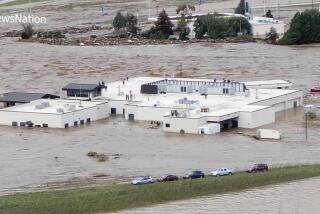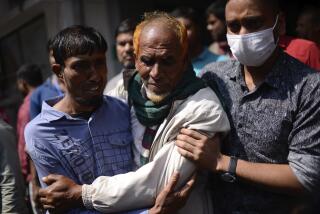Activists: Bangladesh workers told to enter building before collapse
Garment workers in Bangladesh were so uneasy about the cracks in their building that as many as 2,500 refused to enter Tuesday, according to a labor rights group.
Activists say the building’s owner and several factory managers assured the workers that they had nothing to fear and prodded them back to work Wednesday – barely an hour before the eight-story building collapsed, crushing to death scores of people under a mass of concrete and debris.
“The workers were absolutely frightened,” said Charlie Kernaghan, director of the Pittsburgh-based Institute for Global Labor and Human Rights, which has offices in Bangladesh. “They saw those cracks with their own eyes.... But they felt they had no choice. If you don’t go to work, you’re not getting paid.”
At least 80 people were killed when Rana Plaza, on the outskirts of Dhaka, tumbled to the ground, according to news reports. The building housed several garment factories and hundreds of shops, the Disaster Management and Relief Ministry said.
The death toll is expected to rise as rescuers struggle to reach people trapped under the rubble, emergency service officials told Bangladesh Sangbad Sangstha, the national news agency. Weeping survivors and anxious relatives gathered around the wreckage.
Outside the Enam Medical College and Hospital morgue, Rana Ahmed wailed, “Where’s my mother? Where’s my mother? Tell me, tell me, oh Allah, oh Allah,” according to the Associated Press.
The booming Bangladeshi garment industry has been the subject of repeated complaints by labor watchdogs who say dangerous working conditions have killed and maimed hundreds of people.
More than 70 people were killed when another factory collapsed in the same area eight years ago, the national news agency reported. In November, 112 workers perished in a factory fire.
Bangladeshi officials vowed to take action in Wednesday’s disaster, saying construction rules were flouted.
“Stern legal actions will be taken against the people who built the structure, defying the codes or laws,” Home Affairs Minister Muhiuddin Khan Alamgir told the national news agency.
The promises failed to impress Kernaghan and other activists, who said that there had been scant change since the November blaze and that safety standards are routinely ignored.
Kernaghan said a local government official had advised workers not to enter the building Tuesday, but that did not stop the factories from reopening the next day.
“The government is almost scared to enforce regulations about safety when the garments industry is concerned,” Sabir Mustafa of the BBC Bengali Service said in a television broadcast Wednesday.
The owner of the building and factory managers could not immediately be reached for comment late Wednesday.
The chairman of one of the companies, Muhammad Anisur Rahman of Ether Tex Ltd., told Reuters news agency that the cracking was on a different floor than his factory and he knew of no warnings against opening.
“The owner of the building told our floor manager that it is not a problem and so you can open the factory,” he was quoted as saying.
Kernaghan also blamed Western companies that use the Bangladeshi factories to manufacture clothing. His group identified Children’s Place and Cato as among the clients of the collapsed factories. The two companies did not immediately return calls seeking comment.
Activists with the Clean Clothes Campaign in Amsterdam tied the factory to a host of other European and American brands, including Wal-Mart. The company said it was investigating whether a factory in the building was making products for Wal-Mart.
“We remain committed and are actively engaged in promoting stronger safety measures and that work continues.” the company said in a statement.
Labor rights activists are urging companies that manufacture clothing in Bangladesh to sign on to an agreement that includes building inspections, worker rights training and other reforms.
ALSO:
Clashes between police and Uighers in China leave 21 dead
Could Iran’s presidential politicking open door to nuclear deal?
Israel’s claim about Syria chemical weapons highlights ‘red line’
More to Read
Sign up for Essential California
The most important California stories and recommendations in your inbox every morning.
You may occasionally receive promotional content from the Los Angeles Times.










